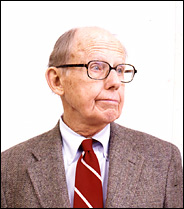|
 |
|
Esta página no está disponible en español. THE NEW YORK TIMES Three Cheers For Assimilation QUESTIONS FOR SAMUEL P. HUNTINGTON Interview by DEBORAH SOLOMON May 2, 2004
Over 50 percent of the immigrants coming into the country are Hispanic, from Mexico and elsewhere in Latin America. And about half of the people coming into the country speak a single, non-English language. That is totally unprecedented. Some of us find it surprising that a man like yourself, a Harvard professor and an eminent political scientist, would see the trend toward bilingualism as such a threat. There are perfectly decent, responsible, democratic countries, like Canada and Belgium, that are bilingual. But that does create its own distinctive set of problems. But aren't those problems relatively small? Doesn't America's greatness lie in its ability to assimilate all kinds of people? The founding fathers were ambivalent about immigration. They invented the word ''immigrant'' in the English language to describe the people coming in who were different than themselves. They did say if immigrants come, they should be dispersed. Your book implicitly endorses Anglo-Protestant values. Would America be the country it has been and still is, pretty much today, if in the 17th and 18th centuries it had been settled not by British Protestants but by French, Spanish or Portuguese Catholics? The answer is no. It would not be America. It would be Quebec or Mexico or Brazil. But we've welcomed waves of immigrants since. Immigration has been central to American development, as well as my personal life. My wife is the daughter of an Armenian immigrant who assimilated totally and successfully, as immigrants should. How, exactly, would you define the culture that you think immigrants need to embrace? We are talking about the core culture of this country, which derives from the founding settlers and includes the work ethic and individualism. It also includes the English language, English legal institutions, social institutions and customs. What about English food? Wouldn't you rather have pizza or sushi than shepherd's pie? I'm not talking about culture in that sense. I am talking about a whole set of values. Are you an immigrant? I hope you're not one of those Mayflower snobs. The Huntingtons arrived in Boston in 1633. Almost all Huntingtons in the U.S. are descended from Simon and Margaret Huntington, who were part of a group of settlers from Norwich, England, who founded Norwich, Conn. Did you grow up in a WASP-y mansion in Connecticut with servants? WASP yes, servants no. I grew up in an apartment in Astoria, Queens. Do you think that there is any truth to the stereotypical view of WASP's as emotionally cold people? Wait a minute. You're talking about people. I am not talking about people. I am talking about ideas and practices. What do you say to the fact that about 10 percent of the U.S. soldiers serving in Iraq are Hispanic? Again you are talking about people. What else is there besides people? There is what people believe, what their assumptions are. I am concerned about the degree to which people -- whatever their color -- believe in the American creed and accept American values. What political party do you belong to? I'm an old-fashioned Democrat. I was dead-set against us going into Iraq. Will you vote for Kerry, then? Oh, yeah. I've met him several times. He lives a few blocks away from me on Beacon Hill. How can you reconcile being a Democrat with your views on immigration and assimilation? Actually, both parties are divided on immigration. And as a scholar I have a responsibility to study society and try to call people's attention to things they might not welcome looking at.
|

 Your new book, ''Who Are We? The Challenges to America's National Identity,'' suggests that Hispanic immigrants are undermining the greatness of the United States.
Your new book, ''Who Are We? The Challenges to America's National Identity,'' suggests that Hispanic immigrants are undermining the greatness of the United States.